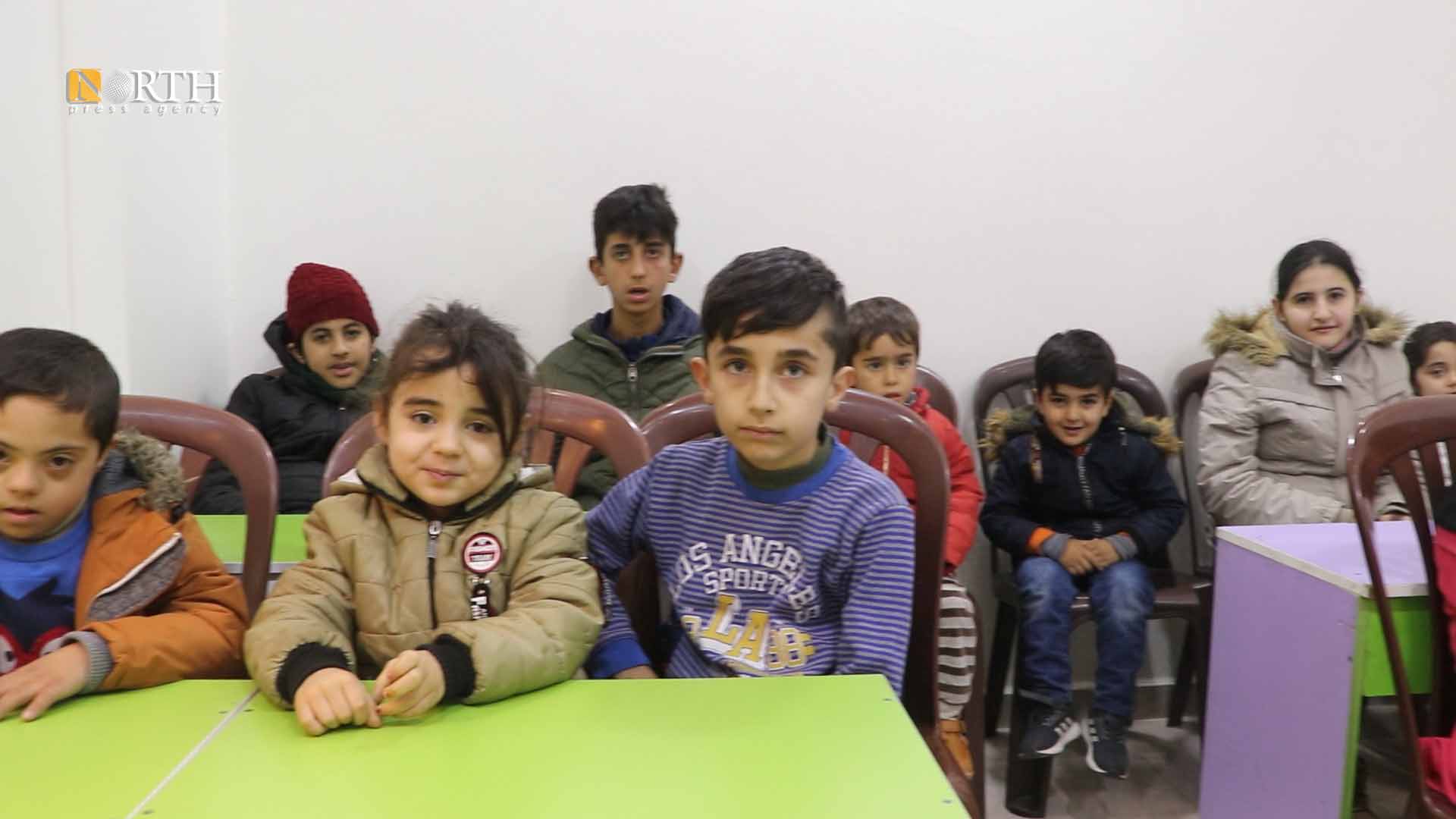QAMISHLI, Syria (North Press) – Manal Ali, is waiting for her son Muhammad to discharge from Bissan Center for Autistic Children, Speech Disorders and Psychological Counseling so that he can complete his education.
Manal, from the city of Qamishli, northeast Syria, is also a trainer at the center.
She expresses her joy because her child make an excellent progress after more than two years of treatment at the center, “Thankfully, after two years of treatment my son’s reaction becomes excellent, he can now say a full sentence, and can interact with his friends.”
Bissan Center in Qamishli treats autism cases, as well as neuromotor acquiring deficiency, in addition to treating children with learning and speech difficulties, providing psychological counseling and Down syndrome.
The center receives children with autism of all ages and stages, according to the center’s management.
The World Health Organization (WHO) defines Autism spectrum disorders (ASD) as a diverse group of conditions.
They are characterized by some degrees of difficulty with social interaction and communication. Other characteristics are typical patterns of activities and behaviors, such as difficulty with transition from one activity to another, a focus on details and unusual reactions to sensations.
About one in 160 children has an ASD, according to WHO.
Available scientific evidence suggests that there are probably many factors that make a child more likely to have an ASD, including environmental and genetic factors.
Despite the increasing number of people with ASD, it is still unknown to a large percentage of people, as they are ignorant of how to deal with the autistics.
“Became normal child”
Since the opening of the center in 2018, about 110 children have finished their treatment, who have received sessions and treatment plans in the center, in addition to the cases that were treated in individual speech sessions, according to Maher Ja’lo, director of the center.
Another group is scheduled to finish their training within the next few days, and Manal’s son, Muhammad, will be one of them.
The mother took her child to many doctors in Qamishli, so he was diagnosed with autism, “the doctor prescribed medicines for him, but we all know that autism is not treated with medicines.”
“When I first recognized that my child has autism. As a mother, I have a strong motivation to fight the world, myself and society, to ensure that there is a cure for autism,” the mother said.
The mother expressed her annoyance at the society’s bullying on her child, “The most hateful word that everyone used to tell me and motivated me is “he is insane and can’t make any progress.”
Because the region lacks autism treatment centers, Ali took her child to the Kurdistan Region of Iraq (KRG) and registered him in a center to receive treatment, but after the opening of Bissan center, she returned to Qamishli and enrolled him in the new center.
Due to the society’s bullying, Ali became more insistent on helping her child, “peoples’ judgment gave me great motivation to treat my son and to resist life’s difficulties so that my son could get the appropriate treatment and go to school as a normal child.”
Last week, the mother showed her child to a doctor in the capital, Damascus, “he told me that my child no longer has any autistic disorder, Muhammad has become a normal child thanks to the center.”
Difficulties
People with autism need accessible health services to meet the general health care needs, including health promotion services, prevention and treatment of acute and chronic diseases, according to WHO.
Autistic people are most vulnerable in humanitarian emergencies, and insufficient knowledge about autism and misconceptions among health care providers is a common obstacle, particularly in developing countries.
Currently, 100 children are receiving treatment at Bissan center, and their treatment is supervised by 30 trainers who have undergone courses on how to deal with children with autism.
The children’s activities in the center starts from nine in the morning until one in the afternoon, and the duration of their treatment at the center varies according to the degree of their case, the extent of their response to treatment and the cooperation of parents.
According to the center’s management, they suffer from difficulties in the lack of equipment, which is expensive, especially since it is a private center and is not funded by any party and relies on children’s premiums for the continuity of work.
On the other hand, there are many children with autism, but the difficult economic situation of their families prevent them from providing the treatment to their children, in addition to the fear of bullying those around them.
Treatment schedule
Maysam Hasariyah, a specialist in autism, learning difficulties, psychological and educational counseling, and lack of acquisition, says “The treatment mechanism begins with enrolling the children in the center for a preliminary diagnosis.”
“Then we move to the testing stage, at this stage we know the strengths and weaknesses of this child, and the things that he/she can do and things cannot do and based on that we put an individual treatment plan for each child,” Hasariyah further explained.
She indicated that “This plan is evaluated at the end of each month, the educational supervision responsible for the work of the trainers and according to the report we get on the condition of each child the skills change and the treatment plan changes at the end, we reach the stage of integration.”
Hasariyah pointed out that the main goal of treating children with autism at the center is to bring them to the stage of being normal.
“The center is a therapeutic plan that depends in its plans on two main parts, namely, nutritional therapy, which defines the goal, and occupational therapy, in which the child is brought to the stage of a normal child.”
“The center relies in its plans on two main parts, namely, nutritional therapy, which defines the goal, and occupational therapy, in which the child becomes a normal child.”

